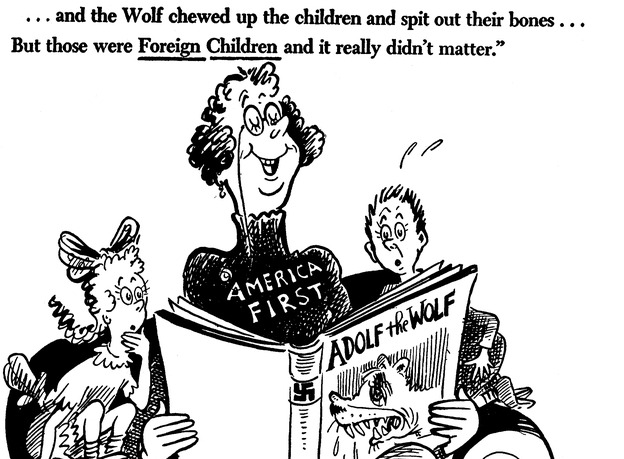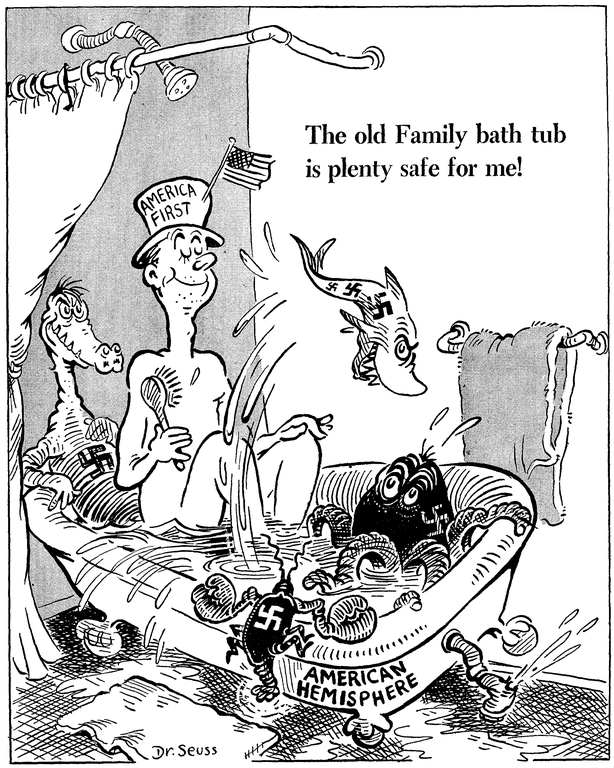Only America First
« previous post | next post »
A question asked on Facebook:
Okay, linguists who work on focus sensitive particles – can you tell me what on earth this means? "From this day forward, it’s going to be only America first" I couldn't bear to listen so I don't know where the focal accent was, but no possibility makes sense. 'only AMERICA first'? since there's only one thing first, isn't the 'only' redundant? 'only America FIRST'? as opposed to second? please do enlighten…. Of course this is hardly the most important thing to be worried about today….
I listened, and even transcribed, so here's the quote:
From this day forward,
it's going to be only
America First.
America First.
The context verifies what the prosody suggests, namely that only governs the whole phrase "America First":
We assembled here today
are issuing a new decree
to be heard in every city,
in every foreign capital
and in every hall of power.
From this day forward,
a new vision will govern our land.
From this day forward,
it's going to be only
America First.
America First.
on trade,
on taxes, on immigration,
on foreign affairs
will be made to benefit American workers
and American families.
We must protect our borders
from the ravages of other countries
making our products,
stealing our companies and destroying our jobs.
and I will never ever let you down.
This passage was apparently one of the things that made Jesse Jackson upbeat about the speech.
Update — There seems to be some confusion in the comments about what's under discussion here. Many linguists have written about the phenomenon of "association with focus", where phrases like "Kim only likes spicy vegetables" can have several different meanings — even different truth conditions — depending on the placement of intonational focus. Thus:
Kim only likes SPICY vegetables. → Kim doesn't like non-spicy vegetables.
Kim only likes spicy VEGETABLES. → Kim doesn't like spicy version of other kinds of food.
Or it could just mean that the only relevant thing Kim likes is spicy vegetables.
In Donald Trump's inaugural, he might conceivably have meant to focus America:
It's going to be only AMERICA first. → No other country will be first.
Or maybe first:
It's going to be only America FIRST. → America won't be anything else.
But in fact Mr. Trump doesn't especially emphasize either of the two words, and I suggested that the context tells us that he meant to associate only with the whole phrase, meaning something like "We will operate on no principle other than 'America First'".
Mr. Trump and his advisors might have chosen a slogan with less historical baggage than America First. Here are a few of the 1940-41 PM cartoons on the topic by Theodor Seuss Geisel:



Tom Saylor said,
January 22, 2017 @ 11:28 am
I'm thinking the 'it' implicitly refers to something like an inspirational refrain or watchword, so I'd be inclined to transcribe the sentence like this:
From this day forward, it's going to be only "America first!"
On that reading, the 'only' suggests that no principle other than the one summed up in that slogan will be invoked in presidential decision-making.
[(myl) Yes, that's a paraphrase of what it means in this context for only to be associated with the whole phrase "America First".]
Only America First • Zhi Chinese said,
January 22, 2017 @ 12:11 pm
[…] Source: Language Only America First […]
Michael Watts said,
January 22, 2017 @ 2:47 pm
I tend to see the "it" as functioning similarly to "it" in it's raining.
e.g. "Everywhere you go, it's all 'America First!' 'America First!' ", although I find that example a little more awkwardly phrased.
philip said,
January 22, 2017 @ 4:35 pm
Maybe we can ut the only where it should be? 'It's only going to be 'America First' or even better 'It's going to only be 'America First' i.e. it is not going to be anything else but 'America First'.
philip said,
January 22, 2017 @ 4:36 pm
Maybe we can put the 'only' where it should be? 'It's only going to be 'America First' or even better 'It's going to only be 'America First' i.e. it is not going to be anything else but 'America First'.
[(myl) Again, this is exactly what it means to say that only associates with the phrase "America First".]
John Swindle said,
January 22, 2017 @ 4:45 pm
But wasn't the question about "only America first"? I took "only" in this case to mean "always." Not that I agree with the sentiment. I don't.
John Swindle said,
January 22, 2017 @ 4:46 pm
I posted before seeing philip's comment.
philip said,
January 22, 2017 @ 6:37 pm
orry myl – I did not see the whole post and the update the first time.
philip said,
January 22, 2017 @ 6:44 pm
myl: and I see now you are discussing intonational focus, but there are grammar mavens in the Blighted Isles who get all worked up about the placement of 'only' in the written language, even when the intended meaning is obvious.
So they correct
Jimmy only killed the dog.
to
Jimmy killed only the dog.
[As if the intended meaning in the first sentence could be: Jimmy only killed the dog, he did not hang and quarter it and then place its head on a spike at the Tower of London.]
Ray said,
January 22, 2017 @ 7:46 pm
in some online transcripts, the word "only" is missing before "America first" — suggesting that the speech as written (and distributed to online news orgs) differs somewhat from the speech that was delivered.
it could be that trump was ad libbing a bit, and that this is what he meant: "From this day forward, a new vision will govern our land. From this moment on, it’s going to be only this: America first."
(ie, the "only" refers to the vision, a clear, undivided mindset…)
Brett said,
January 22, 2017 @ 8:05 pm
They say "American First," but they mean, "American next,"
In Washington, Washington.
https://www.youtube.com/watch?v=_k83WArW5XU
Outeast said,
January 30, 2017 @ 6:12 am
@ Phillip,
While I'd never correct the sentence as you suggest, I certainly can't agree that "the intended meaning it obvious"; at least, it was the third interpretation I reached when reading it. The first being something like, " the only thing he did was kill the dog", the second with "only" in the colloquial usage as in "he's only gone and bloody killed the dog, hasn't he?" Your intended reading – that there was someone or something else killable, and Jimmy didn't kill it – was certainly not especially obvious to me. So, you know: assumptions. Someone changing that sentence might not be being as mavenish as you suggest, but responding to a genuine sense of derailment. (Again, I wouldn't change it that way – but I might want to reword to be less garden pathological).